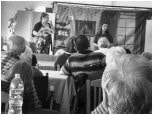Cognitive stimulation
 Engagement of people with dementia in activities and discussions enhances cognitive and social functioning. The most common form of cognitive stimulation encompasses group sessions led by a trained coordinator, for instance discussions about the past, events of the day, travel or food, word games and quizzes. Mounting evidence points out that cognitive stimulation programmes enhance cognitive function in people with mild to moderate dementia over and above any medication effects. The positive effects seem to maintain up to three months after the end of the treatment. Moreover, self-reported quality of life and wellbeing, communication and social interaction seem also to improve, whilst the effects of cognitive stimulation on mood disturbances, activities of daily living, problem behaviors or family caregiver outcomes are rather minimal. Interestingly, computer-based forms of cognitive stimulation have been shown to be equally effective as traditional ones.
Engagement of people with dementia in activities and discussions enhances cognitive and social functioning. The most common form of cognitive stimulation encompasses group sessions led by a trained coordinator, for instance discussions about the past, events of the day, travel or food, word games and quizzes. Mounting evidence points out that cognitive stimulation programmes enhance cognitive function in people with mild to moderate dementia over and above any medication effects. The positive effects seem to maintain up to three months after the end of the treatment. Moreover, self-reported quality of life and wellbeing, communication and social interaction seem also to improve, whilst the effects of cognitive stimulation on mood disturbances, activities of daily living, problem behaviors or family caregiver outcomes are rather minimal. Interestingly, computer-based forms of cognitive stimulation have been shown to be equally effective as traditional ones.
Short narrative presentation of non-pharmacological interventions
